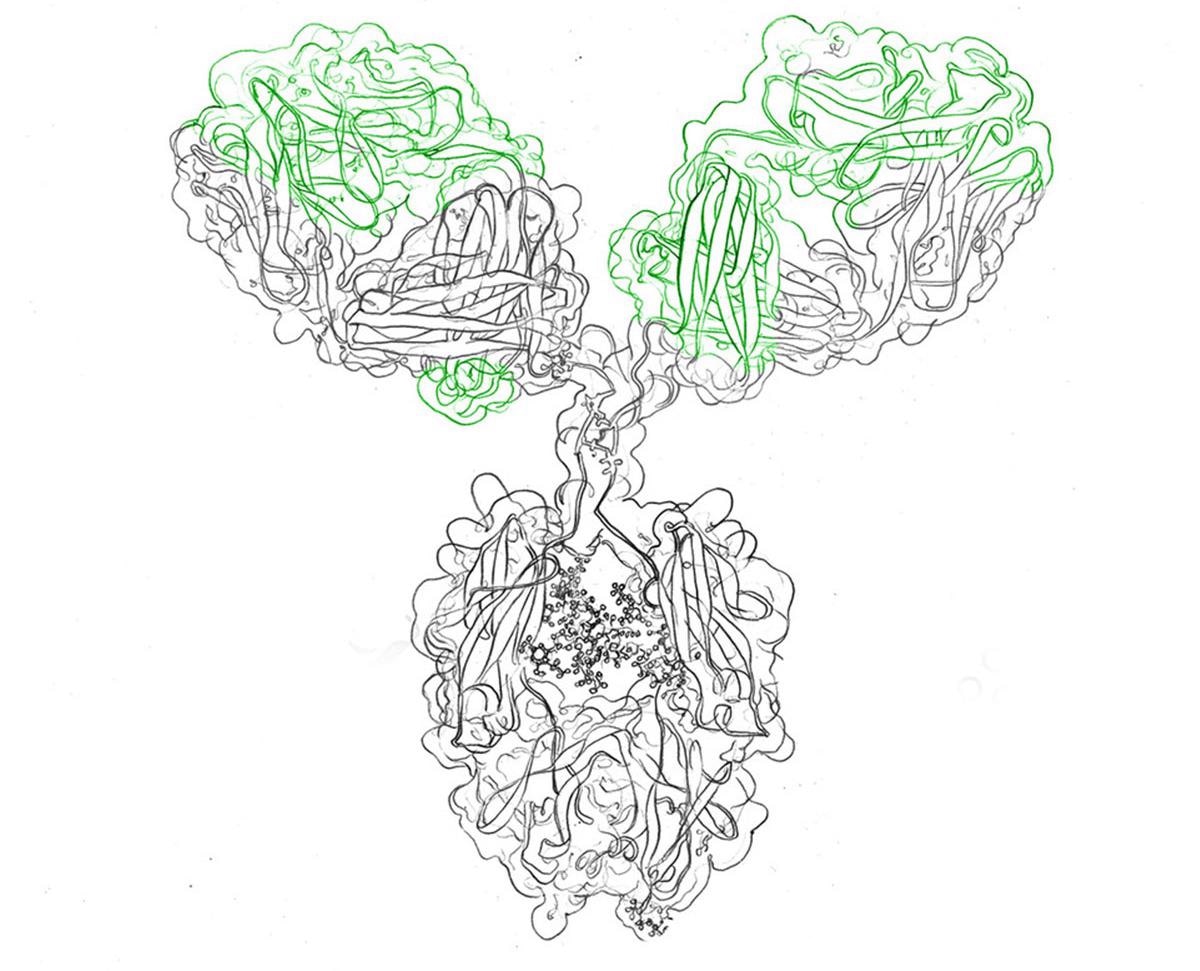Recombinant antibodies are considered the next step in antibody technology. Over the last few years, recombinant antibodies have been shown to play increasingly significant roles in the field of researching and developing medical compounds and therapies.
Tomorrow’s medicine benefits from several key factors that make recombinant antibodies so vital, giving them significant advantages compared to traditional polyclonal or polyclonal antibodies. These advantages include a superior lot-to-lot consistency and a continuous and scalable supply, as well as their suitability for antibody engineering1.

Image Credit: evitria AG (Recombinant Antibody IgG)
Recombinant antibodies: super consistent - lot by lot
Recombinant antibodies are extremely amenable to engineering, which increases their potency when it comes to targeting specific cancer cells or viruses.
This amenability allows recombinant antibodies to be engineered so that they are highly specific and more sensitive than their monoclonal counterparts. Higher antibody sensitivity and affinity can result from this engineering, allowing users to overcome the limitations of other antibody manufacture methods.
It is this option to engineer, their extremely high consistency, along with a sheer endless yield that can be scaled to need that makes recombinant antibodies favorable over their traditional counterparts like polyclonal or monoclonal antibodies produced with hybridoma technique.
Hybridoma-based systems are, as a result of their very nature, prone to genetic drift and instability. This increases the potential for lot-to-lot variability or loss of antibody expression. By contrast, recombinant antibodies, on the other hand, are known for their consistency from lot to lot.
The production of recombinant antibodies requires sequencing the light and heavy antibody chains – a process that allows for a highly reliable and controlled process and reproducible experimental results2.
Scalable production:
Following sequencing, reproduction is the sole focus of the endeavor. The importance of reproducibility and scalability of volumes should not be neglected, despite the fact that the right recipe for manipulating antibodies is perhaps of utmost importance.
The focus will shift to the required amounts once the sequence has been developed. This is where the benefits of recombinant antibodies appear: they can be reproduced seemingly endlessly, and manufacturers can be consistently supplied with the required volumes and types of antibodies with the appropriate contracts in place.

Image Credit: evitria AG (Analyzation of recombinant antibodies)
Why does speed matter?
Simply put, the effects of the pandemic underline how essential speed has become.
While the pandemic may have shone a further spotlight on the importance of speed, the biopharmaceutical industry has always been a particularly fast-moving one.
Labs and manufacturers have always needed to deliver on demand, but the Covid-19 pandemic combined with an ongoing reproducibility crisis once again underlines the importance of a timely on-demand supply of highly-specific antibodies.
Indeed, it only seems logical for (bio)pharmaceutical labs and manufacturers to be outsourcing vital and highly specific steps to external CMOs to ensure a steady flow and keep supply at a sustainable level. Antibody expression and production are two such steps that lend themselves to being taken over by specialized partners due to their highly specific nature.
Antibody expression service providers ensure that their priority is to deliver any desired volume of manipulated matter with a very short lead time as a result of their exclusive focus on expressing and producing antibodies. After all, speed is a crucial factor.
Benefits of recombinant antibodies
As this article has shown, recombinant antibody technology has a number of key benefits over the more conventional route of monoclonal antibody production.
- Scalability: Scalability is key – offering the possibility of seemingly endless reproduction.
- In vitro-process animal-free: Thanks to the process’s agile technology, the entire process is in vitro, so not many resources are required, and the process enjoys increased flexibility.
- High-throughput production: This method offers a faster production method than conventional methods, which rely on animals and hybridoma cell lines.
- Best quality: Thanks to the easy optimization of underlying genetic material, it can be designed to display high sensitivity, affinity and specificity.
- Batch-to-batch reproducibility and consistency: The consistency yields highly consistent antibody products, ensuring beneficial reproducibility and validation between batches
A market-leading global antibody expression service provider, evitria, specializes in CHO-based transient antibody expression and, since its inception in 2010, has an enviable record of completing over 100,000 transfections. With clients located all around the world, evitria’s clients range from small biotech start-ups and academic laboratories to global biopharmaceutical organizations.
References:
- https://pubmed.ncbi.nlm.nih.gov/1751781/
- https://www.ncbi.nlm.nih.gov/pmc/articles/PMC6728236/
About evitria AG
evitria is an established, global antibody expression service provider located in Zurich, Switzerland. We are specialized in CHO-based transient expression of antibodies (including bispecific and fusion antibodies) and other proteins.
With a track record of more than 100,000 transfections performed and more than 17,000 antibodies / antibodybased molecules expressed and purified for our clients from the Americas, Europe, Asia and Australia – ranging from academic laboratories and small biotech start-ups to global biopharmaceutical companies – you can benefit from our expertise when looking to entrust a partner with your complete antibody production or to manage capacity bottlenecks with single projects.
Sponsored Content Policy: News-Medical.net publishes articles and related content that may be derived from sources where we have existing commercial relationships, provided such content adds value to the core editorial ethos of News-Medical.Net which is to educate and inform site visitors interested in medical research, science, medical devices and treatments.